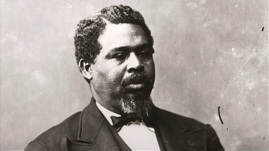Teachers' Domain - Digital Media for the Classroom and Professional Development
User: Preview

Source: Slavery and The Making of America: "The Challenge of Freedom"
This video from Slavery and the Making of America explores the life of Robert Smalls. From the middle to the late 19th century Smalls, a former slave, went from decorated solider in the Union Army to becoming a landowner and eventually a powerful politician during the period of Reconstruction.
Born into slavery in 1839 in Beaufort, S.C., Robert Smalls would become one of the most influential African-American leaders throughout the Civil War, Reconstruction and beyond, despite the inequities he endured as a young man.
As a young boy, Smalls lived with his mother, Lydia, in a slave cabin behind the home of their owner, John McKee. When Smalls was a young man he was sent to Charleston, S.C., away from his family, and hired out as a slave to work on behalf of his owner. When he turned 18, he fought and gained the right to receive some of his hard-earned wages. In Charleston, Smalls held many jobs throughout the city but settled into working on the docks and eventually as a pilot on the steamship Planter.
As the Civil War raged, Robert Smalls was working as a helmsman on the Planter, then a Confederate military ship. Smalls saw the Planter as his ticket to freedom. One night, after careful deliberation, Smalls and a handful of other African-American slaves boarded the ship (after the white crew had left for the evening) and took control of it. Smalls sailed the ship up the South Carolina coast stopping briefly only to board Smalls’ family and the families of the other men. In the dark of the night, Robert Smalls and his crew piloted past a number of Confederate forts, most notably Fort Sumter, and ended their journey with a white flag raised in Union territory.
Robert Smalls and his crew became national heroes not only for their courageous journey from the Charleston Harbor, but also because they revealed strategic Confederate military information to the Union forces. As a reward for their heroism, Smalls and his crew were honored with Congressional prize money from President Lincoln. Smalls would meet with Lincoln again to propose a campaign to enlist African Americans to fight against the South in the Civil War. Lincoln agreed and Smalls set out to recruit African-American soldiers for the Union cause. Robert Smalls went on to fight in 17 battles for the Union throughout the Civil War.
After the war ended, Robert Smalls returned to Beaufort, S.C., as a freed man with his family and purchased the home of his former owner. He hired tutors to teach him to read and write and became a powerful voice in South Carolina politics. He was a U.S. Congressman for five terms and worked as the U.S. Collector of Customs in Beaufort, S.C. for more than 20 years.
Morgan Freeman, Narrator: With the ability to vote and enter politics many African Americans, who had fled the South returned home.
Andrew Billingsley: At the end of the war Smalls came back to Beaufort where he purchased the house where he'd grown up as a slave, where his mother had worked as a slave. His mother was now presiding over the house as a freeperson. She'd been presiding over it for a long time for the McKees now she was doing it for her son. Then Smalls went fairly quickly into politics.
Lawrence Rowland: The Beaufort republican club became the base of Robert Smalls', ah, political career. And Robert Smalls went all over the county canvassing -- as they say, but campaigning. He proved himself to be a very clever orator. Um, great at repartee and ah dramatic in his oratory and often aggressive and colorful and all those things. The black population of the Sea Islands responded immediately to Robert Smalls. And so this was the beginning of his political career.
Morgan Freeman, Narrator: In the spring of 1868 Robert Smalls was elected to the South Carolina State House of Representatives where he joined the black majority in the legislature. It was the only state in the Union to be dominated politically by African Americans. South Carolina, where the Civil War had begun, would become a major proving ground for Reconstruction.
Morgan Freeman, Narrator: Across the country African Americans entered political life at every level of society.
Jim Horton: If you make this comparison between 1860 when 90 percent of black people were slaves and 1868, 1870 when you've got African Americans who are in State Legislature they are black mayors and police chiefs. There are blacks in the U.S. Senate in the U.S. House of Representatives -- they are literally revolutionizing American politics.
Morgan Freeman, Narrator: After the Compromise of 1877, African Americans found themselves increasingly forced out of politics.
Morgan Freeman, Narrator: Across the South black republicans were simply removed from their posts. Roberts Smalls, a U.S. Congressman who could not be removed, was charged with corruption, jailed and eventually pardoned.
Lawrence Rowland: They did to Robert Smalls what they did to a lot prominent black politicians at that time. Those charges haunted Robert Smalls for the rest of his life. But Robert Smalls was a very brave man. Not just stealing the planter but his whole -- fighting in 17 battles in the Civil War he wasn't afraid of gunfire he wasn't afraid of standing up to people who were armed when he was not. He had immense personal courage.
Morgan Freeman, Narrator: Robert Smalls never gave in. To the disdain of the democrats, he continued to run and be re-elected from his predominately black district for nine more years. His leadership would give hope to his people in the years of uncertainty to come.
 Loading Standards
Loading Standards